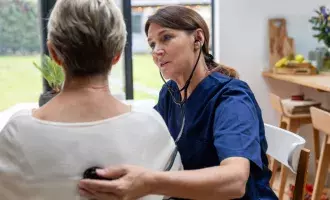Since the onset of the Covid-19 pandemic, the long-term NHS ambition for integrated working has quickly become a reality with cross-agency working to combat the virus.
Partnership working in this way is crucial to understanding the effect of the pandemic on communities, but also to help keep people healthy and ensure they understand how they can prevent illness as well as care for themselves.
A recent report by the NHS Confederation, which brings together agencies from the health service, social care and local government, discusses ways we can bring healthcare to the high street, creating more accessibility for vaccines, management of chronic conditions or preventative advice for example, while also supporting economic and social recovery.
The report acknowledges that a healthy population is likely to reduce the demand for core council services, such as adult social care, while also highlighting the need for integrated care services and primary care networks to embed local economic developments and the high street agenda into their population health strategies. It also highlights the need to understand how to share data with local partners.
The need for better sharing of accurate data was also a key recommendation of the CHKS Advisory Board in its 2020 report. Accurate and trusted data is crucial to providing an overview of a health system and insight into local population needs. This, in turn, will allow targeted interventions and care by providing a clear picture of resource use and patient pathways, encouraging leaders to take a more holistic view of care services and outcomes.
The CHKS Advisory Board was united in its view that quality community intelligence is vital to facilitate closer alignment between health and care systems and therefore more joined-up care.
The role community intelligence will play in effective integration between health and social care is a pressing issue, given the ongoing pressures facing primary and secondary care systems. The Covid-19 pandemic has added an extra layer of pressures, with a greater focus on joined up care, remote care and the possibility of large numbers of people needing treatment in the community due to Long-Covid symptoms, associated chronic conditions or periods of extended recovery.
While acceleration of joined-up care was initially successful, it is now time to take a look at how it worked and to ensure the success continues into the future. The report recommends that it is important for organisations to work together to agree standardised performance metrics that allow for consistent community data collection. At a local level, standardised data collection will enable ongoing, accurate measurement of outcomes and effectiveness of community health interventions. It will also allow benchmarking across community services, which is useful in driving sustainable improvements.
Cross-boundary data sharing will be crucial if community intelligence is to aid effective integration, but a key factor is the accessibility of community intelligence across disparate organisations and systems. Worries around data confidentiality and privacy present significant obstacles, so finding solutions that make it easy to share data securely should be a priority.
Access to data is one challenge but overcoming this will be futile if organisations lack the skills to use data in a useful way. Bringing analytical talent on board to interpret and draw actionable insights from data is, therefore, also essential.
There are undoubtedly a number of barriers to better community intelligence collection and sharing but improving this will go a long way towards building truly integrated healthcare and enabling the creation of a health and social care system which has the ability to support those who need care through a pandemic and beyond.
The Advisory Board was formed to ensure CHKS (the healthcare intelligence and improvement experts of Capita) continues to meet the needs of health and social care organisations. Board members are senior leaders working in health and social care. Read the full Advisory Board report here.







